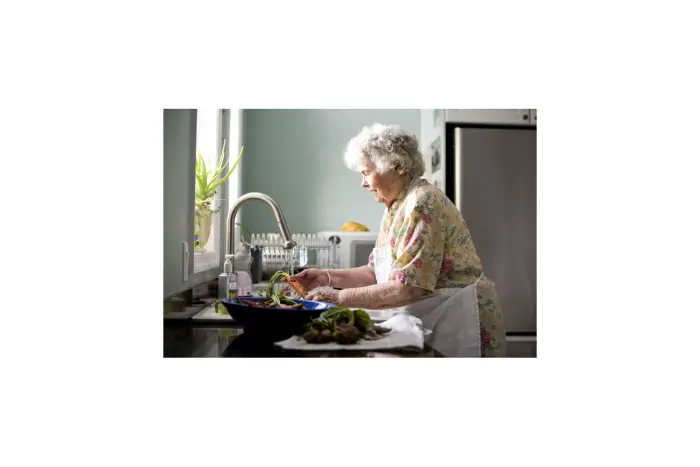With about 17 percent of adult children taking care of their parents at some point in their lives, the topic of ‘mother lives with us’ is familiar to many. And as life expectancy has steadily risen, the time-frame for having an elderly parent live with you can be much longer than you initially thought. So with that in mind, what should you consider about the ‘mother lives with us’ issue beforehand?
First, understand the situation of ‘mother lives with us’ could be a lot longer than anticipated, years or even decades longer. And realize it’s as life altering for elderly parent who are used to independence, as it is for their children. Compassion and communication will be key to making it work.

As someone beyond the point of mid-life, I am now dealing with how best to support elderly parents in addition to my own immediate family. And in particularly, it looks like my mother will be living longer than my father.
This article provided the perfect opportunity to delve into when to have your mom and/or dad live with you; the pros and cons for and against it; and common problems associated with this situation. I’m happy to have the chance to share my thoughts on the issue!
Contents
Should I let my elderly mother live with me?
Books dedicated to caring for elderly parents are on bookstore shelves and Amazon more than ever, like How To Care For Aging Parents by Virginia Morris (this one was hailed as a “compassionate guide” by the Washington Post and “indispensable” by AARP), but the question, ‘should I let my elderly mother live with me’ can really only be answered by you. So how do you do that?
Deciding if you should let your elderly mother (or father) live with you depends on many factors, but should be a decision that takes into account all impacted, as well as discussions about finances; health; daily routines; and boundaries. Intentions and expectations should be clear and transparent.

Intentions: Why do you want to let your mother live with you? And why does your mother want to live with you?
These two questions should have clear, definitive reasons behind them. And if not, then perhaps the answer should be ‘no’ before moving on.
- Are you concerned about your mother’s welfare on her own? Is she recently widowed? Or has her health become a concern for living by herself? Is she able to care for herself? How’s her hygiene? The answer to these questions could be good and valid reasons for wanting to have your mother live with you, but you also must consider if you’re the best candidate. Do you have siblings who could contribute to care? Is outside care better, or a home healthcare nurse needed instead?
- And if your mother asked to live with you, what is her reasoning? Is she lonely or scared? Does she desire more attention from you or your children (her grandchildren)? Or is your mom financially unstable and needs a place to live? The responses to these questions can also be valid reasons for her to want to live with you, but you also have to address other issues in order to make the transition successful. Let’s look at expectations next.
Expectations: What do you desire by letting your mother live with you? Or if the case is flipped, what does your mom desire by asking to live with you?
- Do you want to let your mom live with you so that she has a safe place to be? Will you be available to care for your mom and how much time can you reasonably devote? Who will be in charge of household duties and responsibilities when your mom is living with you? Do you expect ‘mom’ to chip in financially and/or physically? Is childcare a concern or expectation? Will your mom need monitoring?
- Does mom expect you to spend all evenings with her, doing what she likes? Will mom still expect to do independent driving and shopping? Does mom expect to go on vacation with you and get more attention from the grandkids? Who will have the power of attorney for mom’s finances and health decisions?
It’s noble to be concerned about your mother and it’s a sign of good character to even consider ‘should I let my mother live with me’, but as you can see there’s a lot involved. To make it a good environment for everyone impacted, these tough questions need to be addressed before moving on one way or the other.
“Those who respect their father will live a long life; those who obey the Lord honor their mother.”
Sirach 3: 6
Other articles similar to ‘Mother Lives With Us’:
- My Son Wants To Live With His Dad (Mom Explained)
- What to Know About Kids Visiting Grandparents’ House
- Considering Moving Away From Elderly Parents? Not Worth It!
Pros: Taking Care of Elderly Parents Can Be A Win-Win

Now there are clear benefits to taking care of your elderly parents, and even having your mother and/or father move in with you. Let’s look at that now.
Letting elderly parents live with you can be mutually beneficial. Your home provides a safe, secure place for them, and is convenient for you. As well, it gives them companionship and perhaps a renewed purpose in life (if childcare is involved) and quality time together during their golden years.
Pro #1: Safe for Them
- Presumably your home will be more secure and safer than your parents living alone. Whether your mother is widowed, or your dad is a widower, it’s natural to worry about them living solo. If it’s still the two of them, you also know that that situation puts them at greater risk. Many predators prey on elderly, knocking on their door to ‘test the waters’ and see how easy it is to burglarize and what they may have to take. As well, it could be that one is a burden to the other, and it’s too difficult for him or her to be the primary caregiver.
- Your home also provides (presumably) a safety network for mental health and companionship. Whether your parents are still both alive and together, or not, they would probably benefit from having another person around for socializing. Many elderly start to feel isolated on their own. It puts them at risk for others taking advantage of them; and it’s helpful to have you, your spouse, and/or your children around to talk with; to play games with; or just to sit and watch tv together.
Pro #2: Convenient for You
- As working adults, it’s not easy to drop by your parents house. This is even more true if you don’t live close by. For many years, we lived a state away, so in those situations, it’s definitely more convenient to have parents live with you in order to look out for them.
- As well, as parents age, they generally have many doctor appointments. It’s simpler to manage this if you live in the same household.
Pro #3: Renewed Purpose for Them (and You)
- Your parents may be able to look after your children, providing some limited childcare, depending on their health. This can help your parents feel a renewed purpose, especially since they may start to think they’re a burden to you. By looking after the kids, they’re ‘giving back.’ Also, it’s possible they can give back by doing light housework, cooking, or repairs. Again, it’s a way for them to contribute…not that you should move them in with you for this sole purpose. That should not be the case at all!
- It’s also likely that you will feel a renewed purpose too. All of your life your parents have sacrificed and given to you. Now you get to give back. If this hasn’t been the case, and your parents have actually been neglectful but you still let them live with you, it’s a way for you to give back unconditionally and that can be a very good feeling. It’s even closer to what God wants us to do. Give, even when it wasn’t expected.
Pro #4: Builds Relationships
- Your parents will feel revived from their close relationship with you and your children by living in the same household. You’re giving them time that they otherwise wouldn’t have. They’ll smile more than ever, especially after being ’empty-nesters’ for years!
- This close proximity will also provide opportunities for you and your parents to talk like you’ve never done before, adult to adult. They’ll also build a bond with your kids (if applicable), something that will remain with your children long after your parents are gone.
Pro #5: Financially Sound
- It’s likely financially helpful to your parents by letting them live with you. They no longer will be supporting the costs of a house including repairs and regular maintenance, as well as taxes and property insurance. And if they’re able to sell their home for profit, then that money can boost their retirement funds.
- As well, it’s just as likely to be financially beneficial to you to have them live with you. In some cases, adult kids often pay for their parents’ home repairs and incidentals. It’s financially more responsible to manage one household affairs than two. In our case, my parents can’t afford the maintenance on their home so that falls to us. In many ways, it’s a burden because we pay the home insurance and taxes on their place, as well as our own. It would be much easier to sell the house so that we don’t have to do that anymore.
Devil’s Advocate: As well, you may find that there are enough pros for them to continue living on their own or in their own house. For instance, if they’re financially stable and their health is still sound, it might be better for you to just check in on them regularly or for a sibling or cousin to live with them as a ‘back up’ support in the house. This might especially work out if you and your parents live extremely different lifestyles and your parents don’t wish to live with you, too.
Cons: Problems With Elderly Parents Moving In With You
But there are cons to consider too! Don’t go into this arrangement thinking it’ll be a bed of roses, because you’ll be sorely disappointed.
Letting elderly parents live with you can be challenging for everyone. Your parents may resent their lack of independence and view your home as a prison. They may also overstep boundaries in childcare or with your marriage relationship. It may be financially draining and very stressful for you, too.
Independence: It’s likely that your parents have been independent for 40 or more years, so to give up that independence and live with their child may be unwelcome for them. In addition, it will hinder your own independence, too, especially if your parents require round-the-clock caregiving and you’re the provider for that!
Mental Health: Your parents may suffer from depression after moving in with you, feeling like failures or burdens. Taking care of them may also affect your own mental and emotional health. It’s wise to talk to a counselor together and/or on your own to have a sounding board about issues that arise from your new living arrangement, too.
Differing Values: Sometimes problems arise because you and your parents just have different ways of doing things, especially since you’ve been living apart for years. While your parents raised you a certain way, it could be that you even have different parenting values. This becomes sticking points when you start to living together, thinking that they’re butting in, and they feeling that you don’t appreciate their point of view anymore.
Devil’s Advocate: There are cons of them staying in their own home too. Many parents aren’t stable as they get older and it’s a hazard for them to continue to live on their own. In my case, I worry about my parents driving because of their health, yet they refuse to give up that right just yet.
Questions To Answer Before ‘Mother Lives With Us’ Happens
You can avoid many pitfalls for letting your mother live with you by tackling the big questions beforehand.
There are critical questions to address before letting your mother live with you. Questions about expectations; boundaries; finances; and health are some of the bigger issues to consider in order to be on the same page before making long-term changes.
Understanding and respecting boundaries is critical for making living with your mother (or father) again successful, or not. You must respect your mother’s rights as a person, not just your mother. There are certain decisions and choices she deserves to continue to make for herself even if she’s living with you. And vice versa.
Let’s look at a few categories that should be a part of your discussion with your mother and/or father before letting them live with you.
Co-Living From Furniture to Sleep Schedule to Socializing
Your parents are used to doing things their way, for many, many years. Now all of a sudden, they’re in your house, with your furniture, TV, and refrigerator.
You’ll need to discuss boundaries for this.
Will your parents have their own space for decorating and making it their ‘home away from home’? Will they be confined to one room, that is, a bedroom for their space and things, or will they be able to add to other living space? All of this needs to be clear, or you’ll find yourself frustrated over simple things like where a vase or lamp is being placed!
Your parents might be used to a particular sleep schedule too. What are expectations regarding late night TV watching and early morning coffee making?
Should you place a TV and small kitchenette in your mom or dad’s new space so that it doesn’t impose on others?
Can your mom or dad have visitors with or without you being home? Your parents had a life outside of yours prior to living with you. What are expectations for continuing that?
Finances Must Be Addressed
And finances are another big issue to address beforehand. Since your parents would be living with you, will you expect them to contribute financially? If so, how much?
This might be particularly important to think about if there’s a big disparity in your incomes. Perhaps you’re frugal and working hard to save money, and now you see your parent/s being frivolous because they don’t have house ‘bills’ anymore. It’s going to be something you’ll continue to resent if you don’t tackle the issue upfront.
The Takeaway for Mother Lives With Us
What to remember about ‘mother lives with us’ situation is that it’s not a one-size-fits-all, nor is it a simple yes or no. There’s a lot to think about and consider in order to make sure everyone is on the same page with intentions and expectations.
As kids, it’s important that we value and respect our parents, no matter how old we or they are. This doesn’t mean you give in and let them take advantage of you, either. Yet, we owe our mothers and fathers and if that means letting them live with us, then we do whatever we can to make that smooth and successful for everyone.
For more articles related to ‘Mother Lives With Us’, I recommend reading these:
